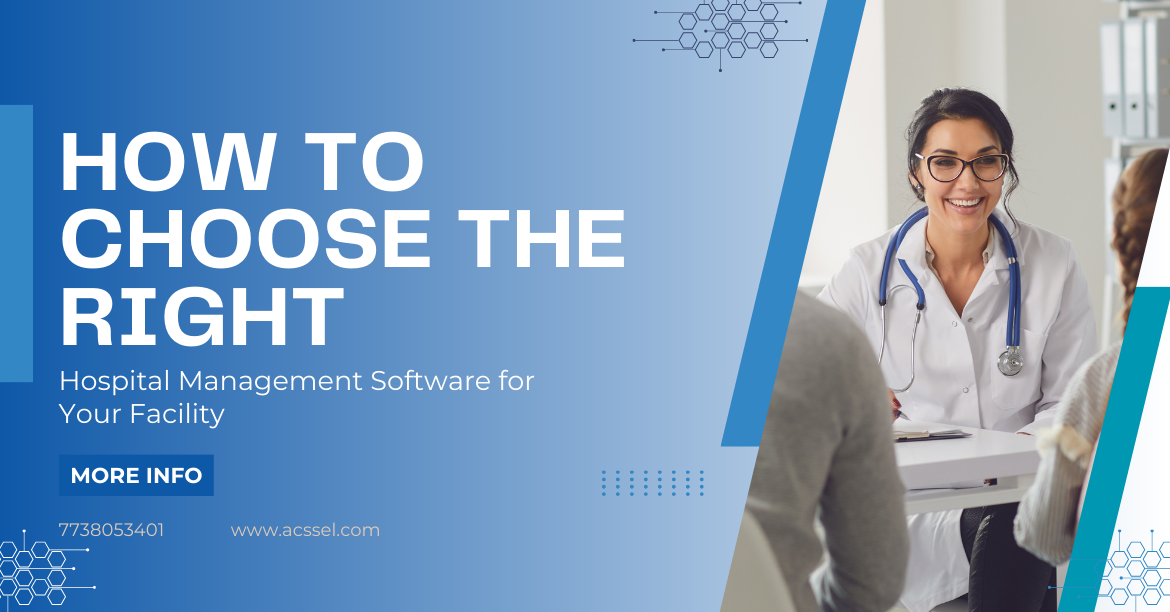


Selecting the Best Hospital software which is a crucial choice that can have a big impact on your healthcare facility's productivity, efficiency, and general standard of care. Choosing the right option can be difficult because there are so many to choose from. With the aid of this guide, you can make sure that the decision you make fits the demands of your facility.

The purpose of hospital management software (HMS) is to optimize a healthcare facility's clinical, financial, and administrative operations. It improves operational effectiveness and patient care by combining numerous tasks like patient management, billing, scheduling, and reporting into a unified system.
When evaluating hospital management software, consider the following essential features:
The software should manage patient information seamlessly, from registration and appointments to medical records and discharge summaries.
Efficient billing and revenue management capabilities are crucial for maintaining financial health. Look for software that automates billing processes, insurance claims, and payment tracking.
An intuitive scheduling system that minimizes conflicts and optimizes the use of resources is vital.
Ensure the software can integrate with existing EHR systems for a unified view of patient data.
Effective inventory management helps maintain optimal stock levels and reduces wastage.
Robust reporting tools are necessary for data-driven decision-making, enabling you to monitor performance and identify areas for improvement.
The software should be easy to use for staff at all levels, minimizing the learning curve and boosting productivity.
Ensure the software complies with healthcare regulations (e.g., HIPAA) and includes strong security measures to protect patient data.
Begin by identifying the specific needs and challenges of your facility. Consider factors such as the size of your hospital, the volume of patients, and the range of services offered.
Conduct thorough research to identify potential software options. Read reviews, seek recommendations from industry peers, and shortlist solutions that align with your requirements.
Compare the features of the shortlisted software. Pay attention to how well they meet your needs, focusing on critical areas like patient management, billing, and reporting.
Ensure the software can integrate with your existing systems, such as EHR, lab management, and best IVF software if you offer fertility services.
Arrange for demos and trial periods to get hands-on experience with the software. Involve key stakeholders, including administrative staff, doctors, and IT personnel, in the evaluation process.
Research the vendor's reputation, considering factors like customer support, software updates, and reliability. A responsive and supportive vendor can make a significant difference in the long-term success of the software implementation.
Evaluate the cost of the software, including upfront fees, subscription costs, and any additional charges for customization or support. Consider the potential return on investment (ROI) in terms of increased efficiency, reduced errors, and improved patient satisfaction.
After thorough evaluation, select the software that best meets your facility’s needs, offers good value for money, and has a solid track record of success.
For facilities offering specialized services like in vitro fertilization (IVF), integrating the best IVF software with your hospital management system can provide additional benefits. Specialized in Best IVF software enhances patient management, cycle tracking, and lab integration, ensuring a seamless and efficient workflow in fertility treatments. When choosing hospital management software, consider its compatibility with the best IVF software to ensure comprehensive and specialized care.
Choosing the right hospital management software is a strategic decision that requires careful consideration of your facility’s needs, thorough research, and evaluation of potential solutions. By focusing on essential features, integration capabilities, user experience, and vendor support, you can select a solution that enhances operational efficiency, improves patient care, and supports your facility’s growth. Whether you're managing a general hospital or a specialized clinic, the right software will be a cornerstone of your success in delivering high-quality healthcare services.